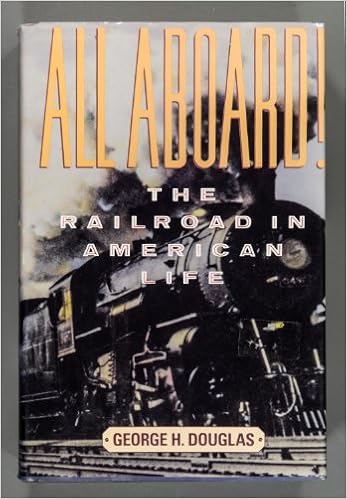Today in a move that should surprise exactly nobody, I am reviewing yet another book about railroad history, something I've done from time to time here on the blog because of my ongoing obsession with trains which I can honestly say has existed since before I can remember. Today I'm looking at an amateur history, All Aboard! The Railroad in American Life, by George H. Douglas. I say amateur history because Douglas is an English and creative writing professor who has written a few histories about railroads, a topic he is interested in, rather than being a professional historian. At the risk of sounding snobbish, I have to admit that it shows through in a couple places in this book and being someone with an education in history I found myself wishing for more in this book, such as more evidence of research.
All Aboard! is an attempt to very briefly cover the history of railroading in the United States from its infancy in the 1820's to about the 1980's. This is an audacious task and would be difficult for anyone to cover in a four hundred page book. There are whole books written about one single railroad, or one specific location, or one specific time period in the history of railroading in the United States. Obviously there is a great amount of detail left out, simply because Douglas just doesn't have the space to talk about it. However, it still feels rather limited in scope for a history of railroads in the United States.
A good example is Douglas's use of anecdotes from the history of railroads to provide vignettes of life related to the railroad. Although the story of Augustus S. Messer, a conductor on the New Haven Railroad, adds a definite human element to the story, Douglas doesn't do a terribly good job of working it into the larger narrative of railroad history. Looking back too, I think that a casual reader might be a little confused. As an avid reader of railroad history I had some of the necessary context to understand what Douglas was talking about, but I think less experienced readers could easily get confused by the use of terminology without explanation.
There are also some comments that just seem terribly outdated for the time when this book was published in 1991. Douglas takes a fairly anti-labor stance in his historical narrative, siding with railroad executives, which is odd considering most historians consider the complaints of labor such as the incredibly dangerous working conditions on railroads as legitimate concerns. I also remember a comment about slave labor in the south used before the Civil War to build railroad lines as being ''fairly well treated'' which bothers me for a variety of reasons, mostly it seems an almost backhanded attempt to justify slavery as not that bad. Which of course is a whole other issue which I've talked about in books that deal more directly with slavery elsewhere.
Another thing that was kind of disappointing was Douglas's inclusion of works of literature, film, and music which included trains and railroads. Sometimes Douglas goes into depth with analyses of a specific work and its use of railroads within the story. Most of the time, though, Douglas just provides a long list of works that include railroads, perhaps in only a minor capacity, and talks about how railroads affect the American psyche in a variety of ways. As an English professor I would expect this to be the most-developed part of his work, looking at how the railroad is portrayed in various mediums. Unfortunately it comes across more as a list of books and movies that have trains in them more than anything else.
The problem with this book seems to be it starts off with a very audacious goal and doesn't quite get where it needs to be. I feel like Douglas would have benefited from more research to give a lot more meat to his text which feels pretty fanciful at times. Ultimately this feels like a book written by a railfan for the enjoyment of other railfans, so if you're already well into the train fandom this book might have some gems you'd enjoy. But if you're a relative newcomer or looking for more nitty-gritty analysis of railroads in the United States, there are better resources out there.
- Kalpar


No comments:
Post a Comment